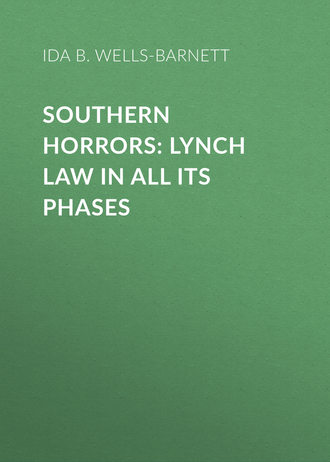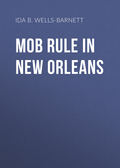
Ida B. Wells-Barnett
Southern Horrors: Lynch Law in All Its Phases
The Afro-American papers are the only ones which will print the truth, and they lack means to employ agents and detectives to get at the facts. The race must rally a mighty host to the support of their journals, and thus enable them to do much in the way of investigation.
A lynching occurred at Port Jarvis, N.Y., the first week in June. A white and colored man were implicated in the assault upon a white girl. It was charged that the white man paid the colored boy to make the assault, which he did on the public highway in broad day time, and was lynched. This, too was done by "parties unknown." The white man in the case still lives. He was imprisoned and promises to fight the case on trial. At the preliminary examination, it developed that he had been a suitor of the girl's. She had repulsed and refused him, yet had given him money, and he had sent threatening letters demanding more.
The day before this examination she was so wrought up, she left home and wandered miles away. When found she said she did so because she was afraid of the man's testimony. Why should she be afraid of the prisoner! Why should she yield to his demands for money if not to prevent him exposing something he knew! It seems explainable only on the hypothesis that a liaison existed between the colored boy and the girl, and the white man knew of it. The press is singularly silent. Has it a motive? We owe it to ourselves to find out.
The story comes from Larned, Kansas, Oct. 1, that a young white lady held at bay until daylight, without alarming any one in the house, "a burly Negro" who entered her room and bed. The "burly Negro" was promptly lynched without investigation or examination of inconsistant stories.
A house was found burned down near Montgomery, Ala., in Monroe County, Oct. 13, a few weeks ago; also the burned bodies of the owners and melted piles of gold and silver.
These discoveries led to the conclusion that the awful crime was not prompted by motives of robbery. The suggestion of the whites was that "brutal lust was the incentive, and as there are nearly 200 Negroes living within a radius of five miles of the place the conclusion was inevitable that some of them were the perpetrators."
Upon this "suggestion" probably made by the real criminal, the mob acted upon the "conclusion" and arrested ten Afro-Americans, four of whom, they tell the world, confessed to the deed of murdering Richard L. Johnson and outraging his daughter, Jeanette. These four men, Berrell Jones, Moses Johnson, Jim and John Packer, none of them twenty-five years of age, upon this conclusion, were taken from jail, hanged, shot, and burned while yet alive the night of Oct. 12. The same report says Mr. Johnson was on the best of terms with his Negro tenants.
The race thus outraged must find out the facts of this awful hurling of men into eternity on supposition, and give them to the indifferent and apathetic country. We feel this to be a garbled report, but how can we prove it?
Near Vicksburg, Miss., a murder was committed by a gang of burglars. Of course it must have been done by Negroes, and Negroes were arrested for it. It is believed that two men, Smith Tooley and John Adams belonged to a gang controlled by white men and, fearing exposure, on the night of July 4, they were hanged in the Court House yard by those interested in silencing them. Robberies since committed in the same vicinity have been known to be by white men who had their faces blackened. We strongly believe in the innocence of these murdered men, but we have no proof. No other news goes out to the world save that which stamps us as a race of cutthroats, robbers and lustful wild beasts. So great is Southern hate and prejudice, they legally(?) hung poor little thirteen-year-old Mildrey Brown at Columbia, S.C., Oct. 7, on the circumstantial evidence that she poisoned a white infant. If her guilt had been proven unmistakably, had she been white, Mildrey Brown would never have been hung.
The country would have been aroused and South Carolina disgraced forever for such a crime. The Afro-American himself did not know as he should have known as his journals should be in a position to have him know and act.
Nothing is more definitely settled than he must act for himself. I have shown how he may employ the boycott, emigration and the press, and I feel that by a combination of all these agencies can be effectually stamped out lynch law, that last relic of barbarism and slavery. "The gods help those who help themselves."




